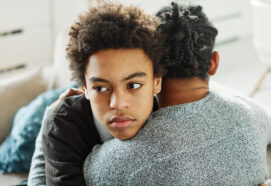The interest in sleep and awareness of its importance is growing in both the medical world and also the press and general population. A 2014 American Academy of Paediatrics technical reports states that “Chronic sleep loss and associated sleepiness and daytime impairments in adolescence are a serious threat to the academic success, health and safety of our nation’s youth and an important public health issue”. With this increasing understanding of the vital role played by sleep comes a recognition of the importance of assessing and addressing sleep problems in clinical encounters.
Sleep and physical health are known to have a bidirectional relationship, where poor sleep is linked to physical health problems but also may be caused by physical health problems- obesity for example has been shown to be contributed to by poor sleep but also may cause poor sleep by predisposing to obstructive sleep apnoea. The same bidirectional complex interaction is true of;
- Sleep and mental health
Take, for example, depression: while a depressed young person may sleep less well and /or have altered recall of sleep duration and quality, they may also be disposed to develop depression because of sleep deprivation. There is a known link between sleep loss and increased suicidality in adolescents which is clearly important to be aware of. - Sleep, substance use and risk-taking behaviour
We know that caffeine and alcohol are both causative of sleep problems but also used by individuals to combat the effect of sleep problems (caffeine) and used with increased frequency in those with chronic sleep deprivation (alcohol) which can exacerbate the situation further. - Sleep and neurodevelopmental problems
ADHD has insomnia and fragmented sleep as known associations, but poor sleep duration also causes concentration problems and poor academic performance as well as externalising behaviour and worsening of executive function, therefore worsening or “mimicking” ADHD…and this is before the effects of medications used in ADHD are considered!
When a clinician takes a truly holistic view of the child in the context of their family, social and school life, we can identify problems in these areas which can also cause sleep difficulties and in turn be caused/worsened by them. And, of course, all the above factors can interact with each other in a bidirectional and complex way!
In fact, it may be fair to say that sleep problems are a perfect example of a “medical” problem that needs a true multisystem biopsychosocial formulation to address the interacting multifactorial causes and diverse effects.
This can be illustrated well by example – it is not uncommon within our clinic to come across a scenario such as this;
A child with known ADHD and sensory difficulties (including “picky eating” leading to relative iron deficiency which causes worsening of concentration and restless legs). The ADHD and restless legs combine to cause sleep onset and maintenance difficulties and also bedtime resistance (as the young person has learned to associate bedtime with long periods of lying awake and unpleasant sensations in the limbs, and the ADHD predisposes to oppositional behaviour). Anxiety (about sleep and/or in association with ADHD) may also well be a feature in this kind of scenario and in turn worsen sleep problems. Poor sleep in this young person may well also contribute to a worsening of concentration/ADHD symptomatology, cognition and mood, and lead to poorer school performance which in turn may worsen mood, anxiety and behaviour with potential reciprocal impacts on sleep. The resulting stressful situation and sleep deprivation for the family may well cause family and parental conflict, poorer parental mental health and therefore reduced ability to meet the challenges of parenting and supporting this young person and lower motivation to engage with behavioural sleep interventions.
In our clinic population we also have often have to factor in the effects of inadequate housing and overcrowding with young people sharing bedrooms with multiple siblings/relatives or sleeping in living rooms etc.
Clinicians who are trained to work in mental health settings are well placed to assess and consider sleep problems as part of their formulation. In addition to this systemic thinking, I would suggest that any clinician working with children and young people in a physical or mental health/developmental setting should have a basic knowledge of the importance of sleep, of how to take a basic focussed sleep history, talk with families and young people about the importance of sleep, give basic advice on sleep hygiene and behavioural interventions for sleep and most importantly to support a family and young person through making any necessary changes.
Further reading
A number of resources to help clinicians gain these skills:
- Bruce et al.
Sleep in Adolescents and Young adults
Clinical Medicine, 2017, Vol 17, No 5, 424-8. - Owens
Insufficient sleep in adolescents and young adults: An update on causes and consequences
Pediatrics, 2014, Vol 134, No 3, September. - Turnbull and Farquhar
Fifteen-minute consultation on problems in the healthy child: sleep
Archives of Disease in Childhood – Education and Practice, 2016, Vol 101, 175-180. - Mindell and Owens
Clinical Guide to Pediatric Sleep; Diagnosis and Management of Sleep Problems
ISBN/ISSN- 9781451193008
Wolters Kluwer 2015 - Southampton Hospital Paediatric Sleep team run regular and excellent sleep training for clinicians.
Acknowledgements
Thanks for advice on content to Dr Jenna Vyas-Lee, Clinical Psychologist, Evelina Secondary Community Sleep Clinic; and Dr Max Davie, Consultant Community Paediatrician, Evelina Children’s Hospital.


